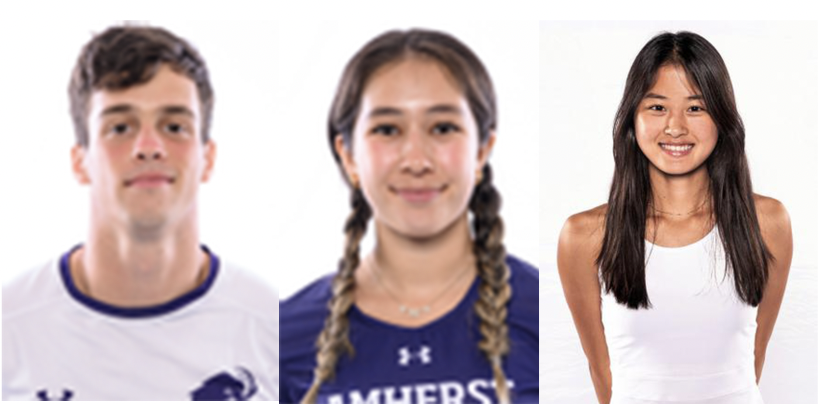International Student-athletes: A Mammoth Adjustment
Staff writer Maya Reiner ’25 sits down with three international student-athletes to gain insight into their unique adjustment process at Amherst.

The experience is one that every Amherst student knows: You pack up all your belongings, head to college, and embark on the next chapter of your life. For many, this transition alone is daunting. You leave behind many of your life’s staples, from having immediate access to your family to the comfort of your own home.
This already unsettling change is exacerbated for those who enter college in the U.S. after having spent their life in a different country. And with the added pressure of playing a collegiate sport, the transition period can become even harder to manage. The Student spoke to three international student-athletes — Anna Aiello ’26, Jonny Novak ’25E, and Sarah Park ’23 — about their experiences handling this transition. While there were broad similarities across all three accounts, each faced a nuanced and unique set of challenges.
Aiello, who was born and raised in Hong Kong, hasn’t faced any drastic challenges in her first two months living in the U.S. and attending Amherst but has noticed stark differences between the two cultures that she has found hard to get used to. To tackle this, she has sought support and guidance through the field hockey team.
“My transition to the U.S. has been relatively smooth thanks to the support of my teammates, coaches, and friends,” Aiello said. “When I first arrived, I experienced culture shock, but I’ve been lucky to have my friends guide me through the everyday norms and cultural misunderstandings I’ve had.”
Park is from Seoul, South Korea, and was recruited to Amherst to play tennis. Like Aiello, she found significant differences between the culture in South Korea and in the U.S., although for Park many of these differences are specifically related to her sport.
“The tennis academy I trained [at] in Korea followed a lot of traditional Korean norms,” Park said. “It was very strict and conservative. To be honest, it wasn’t the best experience. When I came to the states, [and] it’s probably because I am [on] a team now, my teammates are more supportive of each other and really focused on trying to cultivate an encouraging and healthy team culture.”
On the other hand, the transition from a foreign country to playing a sport at Amherst is sometimes minimally shocking. Novak, who is from London and plays on the men’s soccer team, wasn’t overwhelmed at all upon arriving at Amherst. As a child, he had made a number of visits to the states to see his extended family who live here — his parents were also born in the U.S. But he expressed some similar sentiments as Aiello and Park.
“It was still a notable transition given the different culture,” Novak said. “I was a freshman at Amherst during the Covid year [2020]. Not only was it challenging to live in a different country, it was also challenging to be living in a different world during that Covid year.”
And while that made the initial transition a little harder, Novak was able to handle it in much the same way as Aiello and Park. “I made friends, met people who looked after each other which made the transition better and [more] fun,” Novak said.
For international student-athletes who play fall sports, the adjustment period can become much more taxing, as they struggle to assimilate while training and competing at the same time. When Aiello arrived at campus, her field hockey season began immediately. On top of adjusting to living in a new continent, she also had to acclimate to a different style of play in the sport she loved.
“There definitely are quite a few differences,” Aiello said. “In Hong Kong, field hockey is just as popular among guys as it is among girls. [In terms of] style of play, there are different strategies. More strategies are used in the U.S. For example, a player’s position is very fixed on the pitch, whereas in Hong Kong one’s position is [much more] flexible.”
Though there have been striking, significant challenges for Park and Aiello, they are thankful to have made the decision to come to the U.S. to continue their academic and athletic careers. And Novak, who may have experienced the smoothest transition of the three, also shares the sentiment.
“I’m really happy that I made the decision to play soccer in the states,” he said. “I love soccer. It is something that I have cared about so much for such a long time. Being a part of the Amherst men’s soccer team is really one of the best parts of life right now. A part of it is being in the U.S., but the main thing that makes it such an enjoyable experience is being part of the team, my coaches, competing alongside my teammates, and working for each other makes it really so fruitful and enjoyable.”




Comments ()